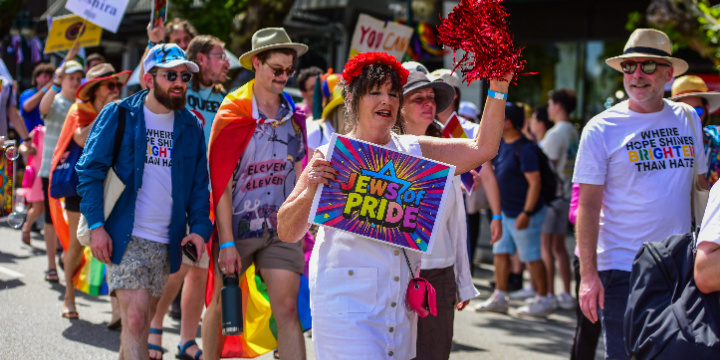Jews of Pride members are seen marching in the Pride parade 2025, part of LGBTQ+ community’s Midsumma Festival. Photo: Alexander Bogatyrev / SOPA Images via Reuters Connect.
I’m a lesbian. I’m alternative. I’m an Israeli-born Jew, and I’m a nurse with more heart than people expect. I adore human beings, with all their qualities and flaws.
Why do these things feel like contradictions in 2025?
Contrary to what the popular narrative has been, especially here in Canada, I don’t want innocent lives taken on any side of the current Israeli-Hamas conflict, and certainly not in the Israeli-Iran conflict. I could never wish suffering upon anybody.
More so, by nature, I’m a healer, which is what drew me to healthcare. Is this, paired with my identities as queer and Israeli-Jewish, such a phenomenon, or are people more closed-minded than they claim to be?
To be queer and Jewish in the year 2025 is to be fluent in complexity. Perhaps where it is most evident is during Pride Month. We should all be celebrating, right? For me, Pride Month has always been a way to celebrate who I am, and to celebrate the freedoms I have here in Canada and in Israel.
Every single Pride celebration around me is associated with anti-Israel movements, and more particularly, all the queer spaces I was once a part of in Montreal have forced me to leave my Jewishness at the door. To have a social life in these spaces means leaving my Jewish Israeli identity behind. That’s the constant heartbreak that I, and people who have the same duality as me, endure.
Thoughts have cycled through my brain over the past almost two years: People say love is love, but would you still preach it, if I told you I was born in Israel? Does my Jewish Israeli-ness take away my validity as a queer person? How can the spaces, the communities that are supposed to be so open minded, promote such hateful speeches? And why do Jewish people in queer spaces have to carry the weight of a country they don’t even live in?
Despite the lack of acceptance, the hate speech and hateful demonstrations in the name of “human rights” in queer and progressive spaces, I show up. I live, I breathe and I love all this community — still.
Despite the cycle of thoughts and questions — rooted in very real experiences I have had — I remain. When met with hatred, I am capable of showing love, perhaps the best demonstration of empathy and resilience.
Resilience is a word, a feeling that carries a lot of meaning for me. It’s waking up everyday knowing that you are hated for who you are, even when you have nothing to do with the war against Hamas, and still keeping your head up. It’s dancing at queer bars, even when it’s littered with people adorned with Hamas red upside-down triangles and keffiyehs, and self-serving claims that “This is an anti-Zionist space.” It’s keeping my heart and my soul open to everyone, even when I’ve been met with hatred repeatedly.
I know my resilience is not my own, because people like Jonathan Elkhoury are proof. As a gay Christian Lebanese man whose family fled Lebanon and found asylum in Israel, he has faced rejection from Arab communities for being gay, from queer communities for being Israeli, and from some in the Jewish community for being Arab. And he still stands tall and proud and is using his voice in online spaces, as a proud advocate for Israel. His story resonates with what many of us Jewish people feel, that we’re complicated, we don’t fit into categories.
Or Emily Damari, a former Israeli hostage released earlier this year, who hid her queer identity from her Hamas captors in order to survive. She lost two of her fingers during the Hamas attack and did not receive proper medical treatment while being held. Her injured hand gesture that she so proudly held on her release became a symbol of resilience appearing on t-shirts and posters in combating antisemitism movements. Another queer Israeli Jewish woman standing proud and solid in her identity.
We often see Jewish resilience being positioned as something that has been in us for generations. The difference between now and then is that resilience now is not, and cannot be, running away or keeping yourself hidden. Resilience can now be dancing at Pride, walking into a queer space and being kind to everyone despite the overt hatred for Jews. Resilience can be simply choosing to exist openly as a queer person, a Jewish person, with no caveats.
I genuinely don’t hold any hate towards anybody. I’ve cried for innocent lives on both sides. I only ask to be gay in peace, without having to leave my identity behind the door for safety measures. I want to walk through Pride celebrations with my Lesbian pride flag, loud and proud, without being confronted with thinly-veiled antisemitism disguised as hatred for Israel.
I want to fall in love without having to hide who I am. I know I will. That’s what Jewish resilience looks like to me.
The author is a nursing student living in Canada.
The post Being Jewish and Gay Today Is an Act of Resistance first appeared on Algemeiner.com.
Click this link for the original source of this article.
Author: Eden Kojdan
This content is courtesy of, and owned and copyrighted by, https://www.algemeiner.com and its author. This content is made available by use of the public RSS feed offered by the host site and is used for educational purposes only. If you are the author or represent the host site and would like this content removed now and in the future, please contact USSANews.com using the email address in the Contact page found in the website menu.








